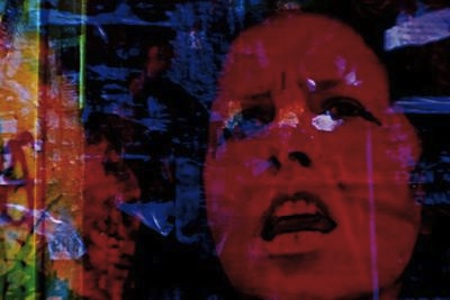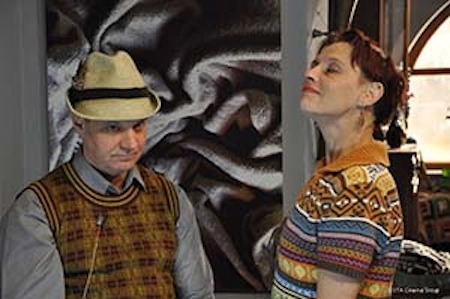I attend film festivals under different identities. The programmer knows he must surf, and sometimes wade, through the new work on his future audience’s behalf; the moviegoer wants to skip procedures, ignore release dates and running times, and see the best films he can. At most festivals, my two sides rarely conflict. But the International Film Festival Rotterdam (IFFR) is different. Few here would begrudge, let alone question, my skipping a world premiere for an older silent film. Each year, it seems, the retrospectives and sidebar programs of rare treasures merit the eagerness of IFFR attendees, many of whom share the open secret that the programming’s ostensible central sections—competitions between new films, many receiving their world premieres—contain several of the weakest films in town. While lightning sometimes strikes (such as last year’s Neighboring Sounds), it’s rare for a wonder to debut here. What’s much more prone to happen at IFFR is that the programs other festivals might consider marginal become central.
“Rotterdam has always had a reputation as the least glitzy and celebrity-oriented of all the major festivals,” says Richard Porton, editor of the critical anthology Dekalog 03: On Film Festivals. IFFR, in contrast to prominent peers like Cannes and Venice,, offers many different kinds of experimental work. Examples abound from the classic definition of the avant-garde as formally rigorous, narratively abstract short work, often produced by young filmmakers from the United States and Western Europe. Fittingly, one must leave the festival center to see many of these films, either riding a shuttle or walking across a bridge, through a Dutch January’s cold and snow, to reach the enormous, angular, white LantarenVenster building. It was here that I saw the great Canadian artist Michael Snow, still prolific at age 83, give an in-person tour through some of his lesser-known interdisciplinary works, including Side Seat Paintings Slides Sound Film, a film of slides of paintings whose images are blurred, calling upon the viewer to imagine his or her own version of them.
The festival encourages fluidity between film and other art forms. Snow, a lifelong jazz pianist in addition to a plastic artist and filmmaker, participated in a daylong event called School of Sound filled with discussions of how sound artists could use film creatively and vice-versa. An entire sidebar program of the festival has been devoted to theatrically projecting long works previously only shown as television miniseries. The Iranian artist Mohammad Shirvani has come with both a film and an installation as part of the sidebar Inside Iran, showcasing varieties of contemporary Iranian filmmaking that range from the latest film by old master Mohsen Makhmalbaf (The Gardener, shot in Israel) to features by new filmmakers and shorts that feel even more like installation and performance art than cinema as it is typically defined to be cinema. The ability of films to talk with other films, and through them have people enter into dialogue, is demonstrated beautifully in Mehrnaz Saeed-Vafa’s short Jerry & Me, in which the filmmaker narrates her journey from a childhood in secular Tehran to adulthood in a casually racist United States through images from the Jerry Lewis films she loved as a child.
“When I met Jerry Lewis in 1996 in Chicago, I knew I had to make a film about what he meant to me growing up in Iran,” Saeed-Vafa writes over email. “I hoped to show how Hollywood movies, in particular his, created a fantasy of America for me, and how, as an adult living in the U.S., I arrived at a new understanding of America and of how movies served as collective memories in both cultures. Above all, I wanted to show my admiration for his art.”
Jerry & Me’s filmmaker identifies herself first and foremost as a viewer. Her gratitude for cinema, running cross-culturally, mirrors that of many festivalgoers with whom I have spoken. American filmmaker Ben Russell, present with the short film Austerity Measures (co-directed with Guillame Cailleau), described his first day at Rotterdam: “Starting with Filipa César’s short film Cacheu and moving through Gabriel Abrantes’ Zwazo, Manoel de Oliveira’s Gebo and the Shadow, and Kira Muratova’s Brief Encounters to arrive at the radically complicated pleasure dive of Harmony Korine’s Spring Breakers, I felt elevated, expanded.”
Muratova’s work in particular gives me a feeling of expanded cinema. Her films are constantly growing larger to break the containers of one’s expectations. In these surreal, fluidly moving carnival acts performed by lunatics, realities morph as the material world gets caught up in human craziness. The possibility of being kicked in the leg or hit with a hammer is as constant as that of meeting a new lover. The Odessa-based director’s films have long been difficult to see in the West; this is the first complete retrospective of her films outside the former Soviet Union.
“Muratova has always been contemporary,” her retrospective’s programmer, Evgeny Gusyatinskiy, writes over email. “As a contemporary artist, she has always been opposing, and even destroying, the changing conventions of art cinema. She created her own cinematic universe, which emerged from classic film traditions, but then transformed a language that needs no context, just constant reinterpretation. She is a self-sustained, self-sufficient, and radically independent artist. However, this does not make her style hermetic or inaccessible—she is actually one of the few great filmmakers to deeply explore the relationships between films and their audiences. Her latest film, Eternal Homecoming, gives one of many instances of her ongoing dialogue with her public, as she pushes viewers to look for radical diversity within repetitions of the same basic scene.”
Rotterdam is excellent at introducing international viewers to great filmmakers previously obscure outside their home countries. While Muratova’s masterpiece The Asthenic Syndrome had loomed legendarily in my mind for years before I saw it, I have only recently learned of the German Dominik Graf, the recipient of another IFFR career (though not complete) retrospective. Graf, perhaps best-known in the United States for contributing to the Dreileben trilogy of crime films, is basically unknown outside Germany largely because much of his work has been made for television rather than for theatrical release.
“He is a unique figure in the German industry,” says Christoph Huber, one of the Graf retrospective’s two programmers (along with Olaf Möller). “He has, within the television system, built up his own production family, including the same actors and the same cameraman, a bit like Raoul Walsh and other old-school Hollywood filmmakers. He’s the only one in the German television industry who makes intelligent, popular cinema. And even within that, he has been misunderstood within Germany. He’s seen as being just a very good craftsman, which he is, but there is also a deeper level to his work, which talks about the changes that modern Germany has gone through, especially once the takeover of East Germany took place. The way things have gone downhill since then is something that German filmmaking in general does not really want to deal with, but in his work it comes through very strongly. His film career is the most interesting history of Germany’s last 30 years that you can have. That, plus he’s made some of the best crime movies of the past two decades—though the crime films only make up about half of his output.”
Rotterdam is unusual among festivals of any size for the care it takes with filmmakers. Its policy is to invite all living directors who have films screening, and its budget however many are able to come. Sometimes this disjunction between art and artist amuses—for instance Graf, the maker of pulsing heist films, is a small, earnest, bespectacled man who smiles shyly when strangers recognize him.
It’s appropriate that a Rotterdam guest receive daily reminders of how films are made by real, living people, as the festival is vital for developing the future of cinema in addition to energizing its past. It was the first major festival to launch a training program for young international film critics, and other large festivals such as Berlin and Locarno have since followed its lead. Far more prominently, the Hubert Bals Fund, named after IFFR’s founder, has given aid to many filmmakers to realize their projects. Past awardees have included globally lauded filmmakers such as the Thai Apichatpong Weerasethakul (whose Uncle Boonmee Who Can Recall His Past Lives received Hubert Bals funding) and the Turkish Nuri Bilge Ceylan. The Fund has been particularly important for directors in countries without strong film industries. In many cases, it has not just made individual films possible, but helped launch and subsequently sustain a filmmaker’s career.
With international co-production becoming an increasingly present reality, IFFR’s CineMart period has similarly taken on great value. During it, distributors and producers from around the world meet with directors who have submitted film proposals. Along with new filmmakers, this year’s CineMart proposers included established figures like Argentina’s Lucrecia Martel (The Headless Woman) and Greece’s Yorgos Lanthimos (Alps), who need help regardless of how well their past films have fared. “We meet producers and directors presenting their new projects, fall in love, and get married all the time,” writes Sandro Fiorin, co-founder of the distribution company FiGa Films, which is now representing seven films as a result of CineMart meetings.
It’s common at IFFR to see diverse film talents meeting, whether for business reasons or social ones. Though the festival is large, it feels intimate, with many attendees gravitating towards the long open hallway on the third floor of de Doelen, the main festival building. “If this was a different kind of festival, I would be here just as a producer,” says Pedro Fernandes Duarte, who represented the Portuguese production company Rosa Filmes at CineMart. “But we don’t have to be so strict about what we are doing here. Rotterdam is very friendly and makes it easy for cinephiles to meet each other, whether they are film critics, actors or directors. Most festivals don’t allow for the diversity of roles that IFFR does. I’m here as a filmmaker, as a producer, as someone who wants to know which films are being made, and as someone who loves cinema.”
For Fernandes Duarte, the ability to share cinema with others also has larger political ramifications. “The Portuguese film industry is in bad shape right now,” he continues. “We had a 100 percent cut in the last two years’ state film financing systems. But when I come here I feel hope that even if things get worse, at least we’ll have some people who are preoccupied with the situation.”
Aaron Cutler lives in São Paulo with his wife, the artist Mariana Shellard. He keeps a site, The Moviegoer, at aaroncutler.tumblr.com.





